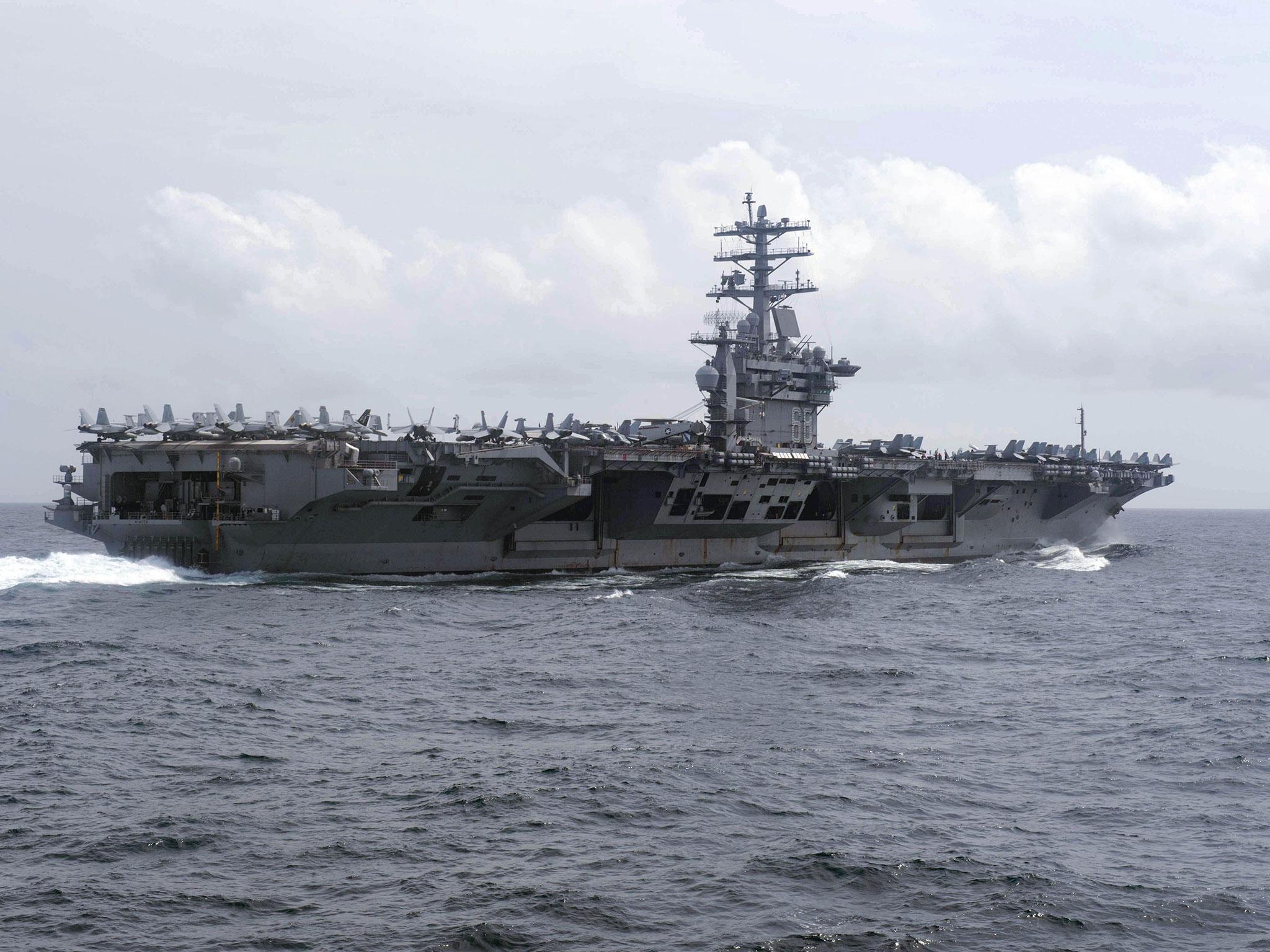US Navy fires warning shot near Iranian vessels, Iranian state news agency says
Tensions between the US and Iran are heating up following the US Congress’s approval of new sanctions against the Middle Eastern country

Iranian and US forces have reportedly engaged in another spat in the Persian Gulf as tensions between the two countries heat up following the US Congress’s approval of new sanctions against Iran.
A US Navy aircraft carrier fired a warning shot in an “unprofessional” confrontation with Iranian vessels, Iran’s elite Revolutionary Guard told a state news agency in the country.
The USS Nimitz and an accompanying ship came near an Iranian offshore oil platform in the Persian Gulf, and a helicopter from the ship hovered near vessels manned by Iran’s elite Revolutionary Guard, the Islamic Republic News Agency said.
The confrontation occurred on Friday afternoon, according to the report. US Navy ships left the area following the encounter.
The US Navy’s Bahrain-based Fifth Fleet had no immediate comment.
The incident comes after a US Navy patrol boat fired warning shots on Tuesday near an Iranian vessel that American sailors said came dangerously close to them during a tense encounter.
Iran and the US frequently have run-ins in the Persian Gulf, nearly all involving the Revolutionary Guard, a separate force from Iran’s military that answers only to the country’s supreme leader. In January, near the end of then-President Barack Obama’s term, the USS Mahan fired shots toward Iranian fast-attack boats as they neared the destroyer in the Strait of Hormuz.
Iranian forces view the American presence in the Gulf as a provocation. They have accused the US Navy of unprofessional behaviour, especially in the Strait of Hormuz, the mouth of the Persian Gulf through which a third of all oil trade passes by sea.
Also Saturday, Iran’s parliamentary committee on national security and foreign policy held an urgent meeting to review its response to a package of sanctions approved by the US Senate and sent to Donald Trump to be signed into law.
Deputy foreign minister and senior Iranian negotiator Abbas Araghchi told state TV that the sanctions package is a “hostile” breach of the Iran deal, which was signed in 2015 during the Obama administration and sharply limited Iran’s ability to produce nuclear material in exchange for the country’s reintegration into the world economy.
Mr Trump in the past has blasted the Iran nuclear accord as “the stupidest deal of all time”, but has certified to Congress that Iran is still complying with the terms of the agreement.
Mr Araghchi said the new sanctions are “a breach of the deal in articles 26, 28 and 29”.
“A strong answer will be given to the action by the US,” he said.
The articles say the US Administration, acting consistently with the respective roles of the President and Congress, will refrain from reimposing the sanctions or any policy specifically intended to directly and adversely affect the normalisation of trade and economic relations with Iran.
The US legislation imposes mandatory penalties on people involved in Iran’s ballistic missile program and anyone who does business with them. The measure would also apply terrorism sanctions to Iran’s elite Revolutionary Guard and enforce an arms embargo. Democrats said the new sanctions would not conflict with the landmark nuclear deal between Iran and world powers.
On Friday, the United States, France, Germany and Britain – who brokered the 2015 nuclear deal with Iran along with China, Russia and the EU – said they’re raising concerns with the United Nations over Iran’s Thursday launch of a satellite-carrying rocket into space.
In a joint statement, they said that Iran’s launch was “inconsistent” with a UN Security Council resolution that enshrined the nuclear deal.
On Saturday Iran’s foreign ministry said the missile program is part of “domestic policy of the country, deterrent and at service of regional peace and security.”
Tehran and Washington have had no diplomatic relations since 1979 when Iranian militant students stormed the US embassy and took 52 American hostages for 444 days.
Agencies contributed to this report
Join our commenting forum
Join thought-provoking conversations, follow other Independent readers and see their replies
Comments
Bookmark popover
Removed from bookmarks